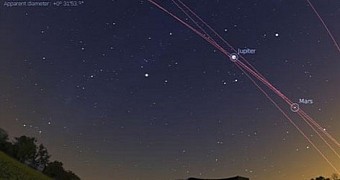Stellarium developer Alexander Wolf was proud to announce the release of the second maintenance update to the stable Stellarium 0.15 series of the open-source and cross-platform astronomical observatory application.
Coming approximately three months after the release of version 0.15.1, Stellarium 0.15.2 is here with over 100 improvements and bug fixes, along with a bunch of new exciting features like an algorithm for DeltaT, orbit visualization data for asteroids, an option for the InfoString group, support for calculating extincted magnitudes of satellites, and sednoids, a new type of Solar system objects.
"This version contains few closed bugs (ported from series 1.x) and some new additions and improvements," reads the announcement. "We have updated the configuration file and the Solar System file, so if you have an existing Stellarium installation, we highly recommended reset the settings when you will install the new version (you can choose required points in the installer)."
The list of new features implemented in Stellarium 0.15.2 continues with a classificator of objects injected into the Solar System Editor plugin, the ability to calculate and display both vertical and horizontal scales of CCD's visible field of view, CCD binning in the Oculars plugin, along with the "Restore direction to initial values" option, various new DSO textures, as well as support for displaying solstices points.
Meade MA12 Astrometric Eyepiece support added to the Oculars plugin
The Oculars plugin also received Meade MA12 Astrometric Eyepiece support, tooltips were added for the AstroCalc features, and it looks like there's now a new scriptable function capable of retrieving landscape brightness. The Search Tool received various improvements as well, and Stellarium now uses the QOpenGLWidget object and ISO 8601 for date formatting in the "Date and Time" dialog.
Among other noteworthy changes, we can mention that Stellarium 0.15.2 separates the storing of view direction/FoV and other settings, implements albedo for infostring to moons and planets, supports caching of landscapes, introduces a mean solar day on the Sun, which equals to an Earth day, and adds an option that allows you to change the prediction depth of Iridium flares.
The new release adds numerous other bug fixes and updates, so we recommend that you study the attached changelog for all the technical details or if you're just curious to know what changes were implemented. In the meantime, we recommend downloading Stellarium 0.15.2 for GNU/Linux, macOS, and Microsoft Windows operating systems right now from our website and update your installations as soon as possible.

 14 DAY TRIAL //
14 DAY TRIAL //